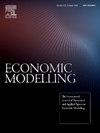Do foreign direct investment and trade affect the relationship between temperature and civil conflict?
IF 4.7
2区 经济学
Q1 ECONOMICS
引用次数: 0
Abstract
This study investigates the role of countries’ outward orientation in the relationship between temperature and civil conflict. We add to existing literature by highlighting the importance of FDI and trade openness as mitigating factors to reduce the risk of temperature-induced conflict. Using data from 62 developing countries covering the period 1990–2022, and incorporating several estimation methods and robustness tests, our results indicate that higher temperature increases conflict risk, while FDI inflows, particularly non-primary sector FDI, and trade openness, weaken the positive association by virtue of technical innovation and their capacity to stimulate sustainable practices and climate adaptation strategies. Hence, greater trade with developing countries, along with higher foreign investment into their secondary and tertiary sectors, alleviates their trade-off between extreme temperatures and civil conflict. This broader understanding of the macroeconomic factors moderating the temperature-conflict relationship offers another valuable perspective for inter-governmental climate policy-making efforts to reduce civil conflict.
外国直接投资和贸易是否影响温度与国内冲突之间的关系?
本研究探讨了各国的对外取向在温度与国内冲突的关系中所起的作用。在现有文献的基础上,我们强调了外国直接投资和贸易开放作为缓解因素的重要性,以降低温度引发冲突的风险。利用来自62个发展中国家1990-2022年的数据,结合几种估计方法和稳稳性检验,我们的研究结果表明,较高的温度增加了冲突风险,而FDI流入(特别是非初级部门FDI)和贸易开放则通过技术创新及其刺激可持续实践和气候适应战略的能力削弱了这种正相关关系。因此,扩大与发展中国家的贸易,以及增加对其第二和第三产业的外国投资,可以缓解它们在极端气温和国内冲突之间的权衡。这种对调节温度-冲突关系的宏观经济因素的更广泛理解,为政府间气候政策制定努力减少国内冲突提供了另一个有价值的视角。
本文章由计算机程序翻译,如有差异,请以英文原文为准。
求助全文
约1分钟内获得全文
求助全文
来源期刊

Economic Modelling
ECONOMICS-
CiteScore
8.00
自引率
10.60%
发文量
295
期刊介绍:
Economic Modelling fills a major gap in the economics literature, providing a single source of both theoretical and applied papers on economic modelling. The journal prime objective is to provide an international review of the state-of-the-art in economic modelling. Economic Modelling publishes the complete versions of many large-scale models of industrially advanced economies which have been developed for policy analysis. Examples are the Bank of England Model and the US Federal Reserve Board Model which had hitherto been unpublished. As individual models are revised and updated, the journal publishes subsequent papers dealing with these revisions, so keeping its readers as up to date as possible.
 求助内容:
求助内容: 应助结果提醒方式:
应助结果提醒方式:


